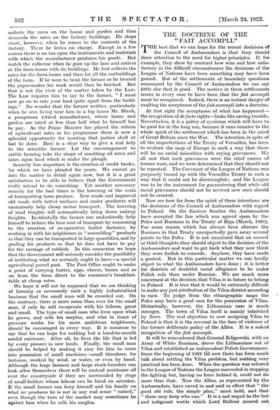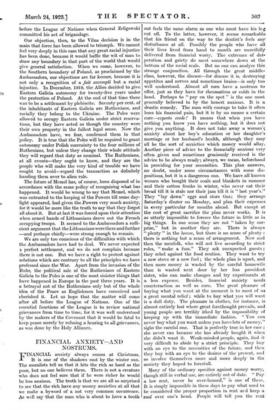THE DOCTRINE OF THE "FAIT ACCOMPLI."
THE best that we can hope for the recent decisions of the Council of Ambassadors is that they should draw attention to the need for higher principles. If, for example, they show by contrast how wise and how satis- factory in the difficult circumstances the decisions of the League of Nations have been something may have been gained. But of the settlements of boundary questions announced by the Council of Ambassadors we can say little else that is good. The motive in these settlements seems in every case to have been that the fait accompli must be recognized. Indeed, there is an instant danger of exalting the acceptance of the fait accompli into a doctrine.. At first sight the acceptance of what has happened— the recognition of de facto rights—looks like saving trouble.
Nevertheless, it is a policy of cynicism which will have to be paid for in the long run, because it runs counter to the whole spirit of the settlement which has been in the mind of Great Britain since the War. The intention, in spite of all the imperfections of the Treaty of Versailles, has been to re-draw the map of Europe in such a way that there will be no racial minorities with crying grievances. We all saw that such grievances were the chief causes of former wars, and we were determined that they should not be repeated. The Covenant of the League of Nations was purposely bound up with the Versailles Treaty in such a way that it could not be disentangled ; and the League was to be the instrument for guaranteeing that while old racial grievances should not be revived new ones should not be created.
Now see how far from the fl spirit of these intentions are the decisions of the Council of Ambassadors with regard' to Poland. On the Eastern frontier the Ambassadors= have accepted the line which was agreed upon by the Poles and Russians in the Treaty of Riga (March, 1921). For some reason which has always been obscure the Russians in that Treaty unexpectedly gave away several points to the Poles. It is not unnatural that on second or third thoughts they should object to the decision of the Ambassadors and want to get back what they now think they were foolish to concede. Anyhow, they have made a protest. But in this particular matter we can hardly object to what the Ambassadors have done ; it is better for districts of doubtful racial allegiance to be under Polish rule than under Russian. We are much more concerned at the decision that Vilna is in future to belong to Poland. It is true that it would be extremely difficult to make any just attribution of the Vilna district according to race. To judge from the ethnographic maps the Poles may have a good case for the possession of Vilna.
Historically, however, the Lithuanian, case is much, stronger. The town. of Vilna. itself is mainly inhabited by Jews. The real objection to now assigning Vilna to. Poland is that it is the reversal in the face of violence of the former deliberate policy of. the Allies. It is a nakedi recognition of the fait accompli, It will be remembered that General Zeligowski, with an Army of White Russians, drove the- Lithuanians out of Vilna and established an independent Polish Government. Since the beginning of 1921 till now there has been much talk about settling the Vilna problem, but nothing very practical has been done. When the question was referred' to the League of Nations the. League succeeded in stopping: the. fighting but, having no force behind it, could not do, more than that. Now the Allies, as represented by the, Ambassadors, have caved in and said in effect that " the; good old rule, the simple plan," must hold, and that " those may keep who can." It is a sad sequel to the hot: and indignant words which Lord Balfour poured out 'before the League of Nations when General Zeligowski committed his act of brigandage.
Our objection, then, to the Vilna decision is in the main that force has been allowed to triumph. We cannot feel very deeply in this case that any great racial injustice has been done, because it would baffle the wit of man to draw any boundary in that part of the world that would give general satisfaction. When we come, however, to the Southern boundary of Poland, as proclaimed by the Ambassadors, our objections are far keener, because it is not only a recognition of a fail accompli but a racial injustice. In December, 1919, the Allies decided to give Eastern Galicia autonomy for twenty-five years under the protection of Poland. At the end of that time there was to be a settlement by plebiscite. Seventy per cent. of the inhabitants of Eastern Galicia are Ruthenians, and racially they belong .to the Ukraine. The Poles were allowed to occupy Eastern Galicia under strict reserva- tions, but they have acted as though the country were their own property 'in the fullest legal sense. Now the .Ambassadors have, we fear, confirmed them in that policy. It is true that the Poles will be required to grant autonomy under Polish suzerainty to the four millions of Ruthenians, but unless they change their whole attitude they will regard that duty as nominal. The Ruthenians, at all events—they ought to know, and they are the people who will make the very kind of trouble we have sought to avoid—regard the transaction as definitely handing them ever to alien rule.
The future of Memel has, of course, been disposed of in accordance with the same policy of recognizing -what has happened. It -would be wrong to say that Memel, -which was entrusted to the keeping of the Powers till some day- light appeared, had given the .Powers very much anxiety, for it would be more like the truth to say that they forgot all about it. But at last it was forced upon their attention when armed bands of Lithuanians drove out the French occupying troops. It seemed to the Ambassadors a suffi- cient argument that the Lithuanians were there and further —and perhaps chiefly—were strong enough to remain.
We are only too conscious of the difficulties with which the Ambassadors have had to deal. We never expected a perfect settlement, and we do not complain because there is not one. But we have a right to protest against solutions which are contrary to all the principles we have professed since the War. Apart from the invasion of the Ruhr, the political sale of the Ruthenians of Eastern Galicia to the Poles is one of the most sinister things that have happened in Europe in the past three years. It is a betrayal not of the Ruthenians only but of the whole idea of the Peace as Englishmen have conceived and cherished it. Let us hope that the matter will come after all before the League of Nations. One of the essential functions of the League is to review national grievances from time to time, for it was well understood by the makers of the Covenant that it would be fatal to keep peace merely by refusing a hearing to all grievances, as was done by the Holy Alliance.



































































 Previous page
Previous page